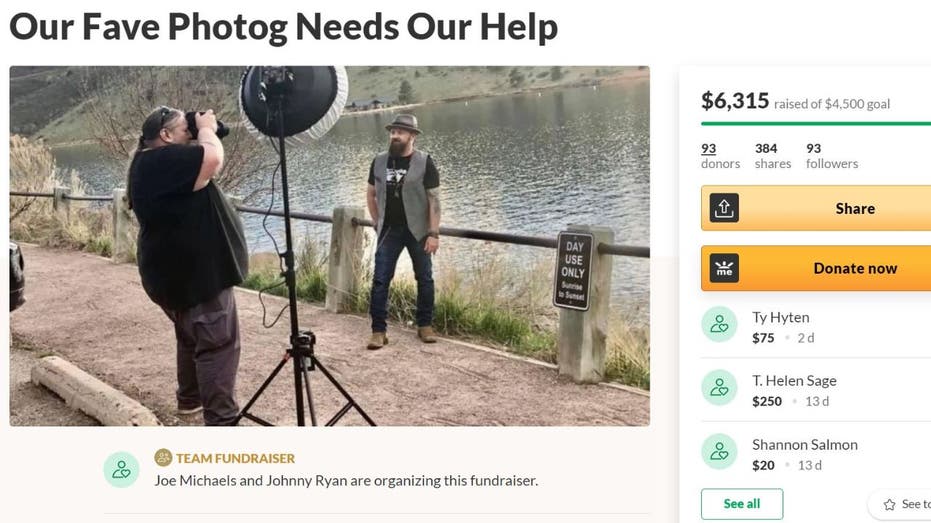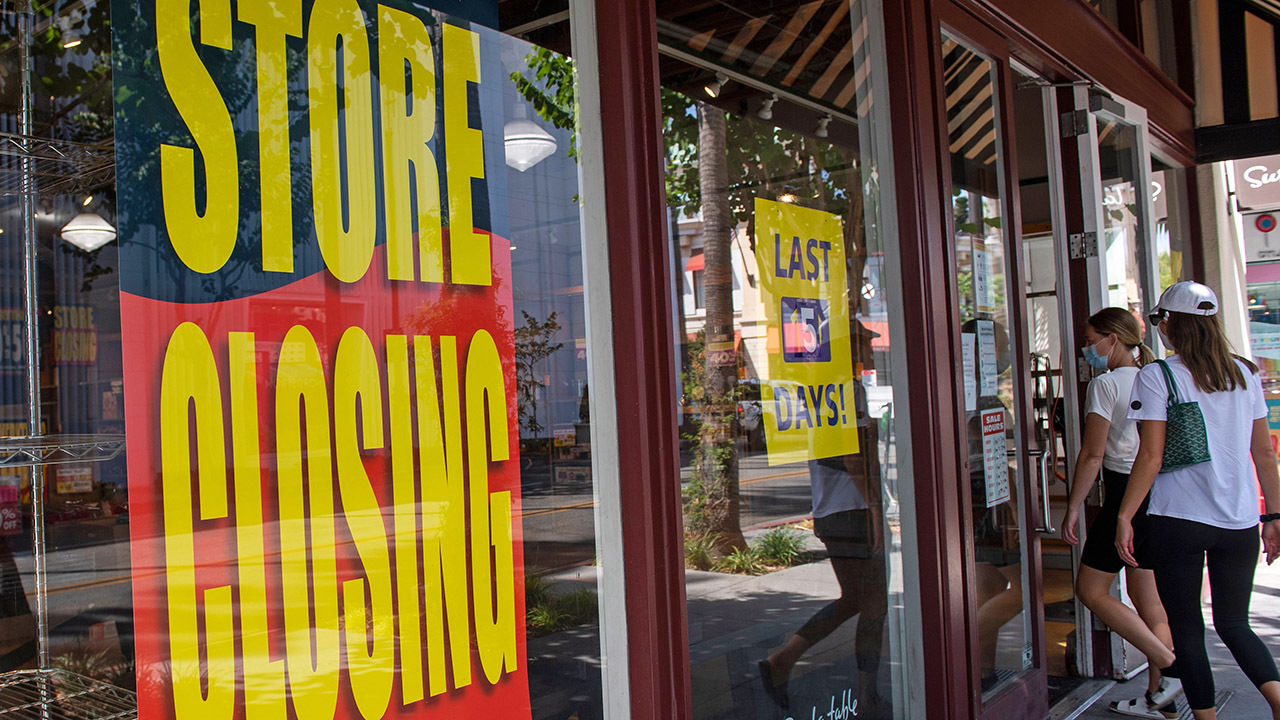In coronavirus recession, the out-of-work turn to GoFundMe
Americans' dependency on donations speaks to deepening inequality
Jim Mimna, a concert photographer in the Denver area, was on the phone with a friend recently when the conversation turned to his finances. Mr. Mimna's business was in free fall and he worried he would get evicted because he couldn't pay the rent.
Shortly afterward, his friend, Joe Michaels, pulled up the crowdfunding website GoFundMe and created a page labeled "Our Fave Photog Needs Our Help." He shared it on Facebook and, within days, the fundraiser surpassed its goal of $4,500.
GoFundMe has long been associated with life's ups and downs -- moonshot inventions and emergency-room bills alike. In the pandemic, it is also becoming a go-to place for people to get help with rent and groceries.
That so many Americans are now dependent on the kindness of neighbors speaks to the deepening inequality between those who can navigate the coronavirus recession and those who can't. The government's social-safety programs, such as food stamps and unemployment, weren't designed to support the large numbers of people who have needed them during the pandemic.

GoFundMe has long been associated with life's ups and downs -- moonshot inventions and emergency-room bills alike. In the pandemic, it is also becoming a go-to place for people to get help with rent and groceries.
"I hope the GoFundMe evidence might be used to show we must do a better job with our social protection system," said William Arnone, chief executive of the National Academy of Social Insurance, a nonprofit that researches Social Security and related programs. "Whatever we're doing now is not working for too many people."
People have raised more than $100 million for basic living expenses in tens of thousands of fundraisers on GoFundMe so far this year, the company said. That is up 150% from 2019 and more than any previous year. Last month, the company introduced a new category of fundraiser, for rent, food and monthly bills.
Fundraisers for the travel and adventure category, such as study abroad and mission trips, are down 45% this year, the company said.
CEO Tim Cadogan said the fact that so many people are now using his company to help pay the electric bill is "a reflection, very sadly, of society." Mr. Cadogan started at GoFundMe on March 2, the day the U.S. coronavirus death toll hit six.
These fundraisers are a small but growing slice of GoFundMe's business, which has helped people raise more than $9 billion between its founding a decade ago and the end of last year. The company, a for-profit owned by a group of venture-capital investors, has gobbled up other firms in recent years including YouCaring and Crowdrise, cementing its dominance in crowdfunding. Because it is private, it doesn't disclose revenue or profit.
TREASURY HAS PLENTY OF ‘FIREPOWER’ IF ECONOMY SOURS: MNUCHIN
GoFundMe and other companies that make money off people's altruism must navigate between maximizing profits and minimizing how much they charge to those raising and giving money, said Ethan Mollick, a professor at the University of Pennsylvania's Wharton School who studies crowdfunding. "I think there has to be careful balance here."
GoFundMe makes money through voluntary tips from donors and can also receive part of payment-processing fees. It also charges fees on its platform used by nonprofits. GoFundMe uses fraud screening to make sure the fundraisers aren't scams, but doesn't always independently verify the information posted by organizers.
Other websites have seen similar upticks. On Fundly, a crowdfunding platform owned by Lumaverse Technologies, there are currently more than 500 live fundraisers by people asking for help with groceries. In October 2019, there were about five, the company said.
Many pleas have taken a deeply personal tone. "It was the first time that I really told anyone but my really close family what was going on with me," said Estrellita Edwell, who created a fundraiser after getting laid off from an arts nonprofit job in Washington, D.C., earlier this year.
In a recent TransUnion survey, more than half of U.S. consumers said the pandemic affected them financially. Some 38% of those impacted said they couldn't pay their credit-card bills and 30% said they couldn't pay for their internet.
Giving usually declines in recessions, but the majority of U.S. households kept their donations the same when the coronavirus first hit, according to a September study by Indiana University's Lilly Family School of Philanthropy. What is more, roughly a third of households made direct contributions in response to the pandemic during its early months. The study doesn't break out what share of those donations went to charitable organizations versus individuals or businesses.
Those in a position to give are often inclined to make localized contributions, according to Kim Williams-Pulfer, a researcher at the Lilly Family School of Philanthropy. A pandemic that effectively shut down the country helped turn people's attention toward the needs of neighbors, she said.
In some ways, Mr. Mimna, the photographer, is lucky. Self-employed and gig workers don't usually qualify for unemployment, but the $2 trillion Cares Act passed in March allowed them to. Large groups of people, including undocumented workers, don't qualify for unemployment at all.
When Mr. Mimna's photography work dried up, he tried to supplement his income by turning some of his photos into Zoom backgrounds and putting them up for sale. He sold most of the art in his house and much of his photography equipment. Mr. Mimna, a single father of a 15-year-old girl and 8-year-old boy, also cut back on expenses. Steak was out; ramen was in.
Mr. Mimna started receiving unemployment benefits in May that amounted to about $700 a week. Then, the extra $600 a week provided by the Cares Act expired at the end of July, reducing his benefit. Mr. Mimna stopped filing for unemployment benefits and instead got a part-time delivery job, though car troubles have recently made that work tougher.
GET FOX BUSINESS ON THE GO BY CLICKING HERE
It was difficult for Mr. Mimna to keep up with his $1,350 monthly rent. After he fell three months behind, an eviction notice landed on his door in the early fall.
Mr. Michaels created the fundraiser for Mr. Mimna in mid-October. Patti Mason, who hired Mr. Mimna as her wedding photographer years ago, saw it on Facebook. Though Ms. Mason's husband has lost some work as a musician, her pay at a software company has been steady. She donated $50 and booked a photo shoot for her family.
"I don't have lots of money to give," Ms. Mason said, "but I can certainly find the Jims of the world."
Mr. Mimna was surprised by the fundraiser and said he felt overwhelmed and thankful. "There's a lot of downs," he said, "so having that happen was pretty uplifting."
Mr. Mimna used his GoFundMe money to pay the $4,500 he owed to his landlord. He has since fallen behind again. A temporary federal halt on evictions means he can stay for now, he said.




















